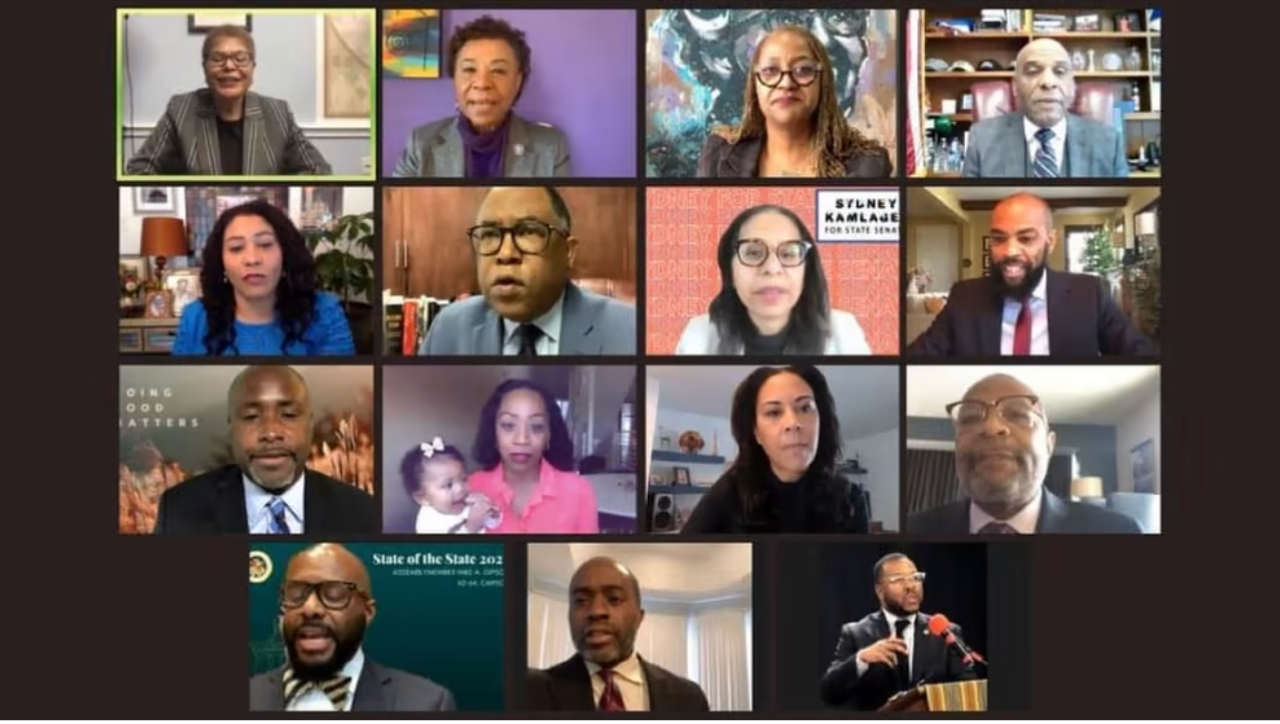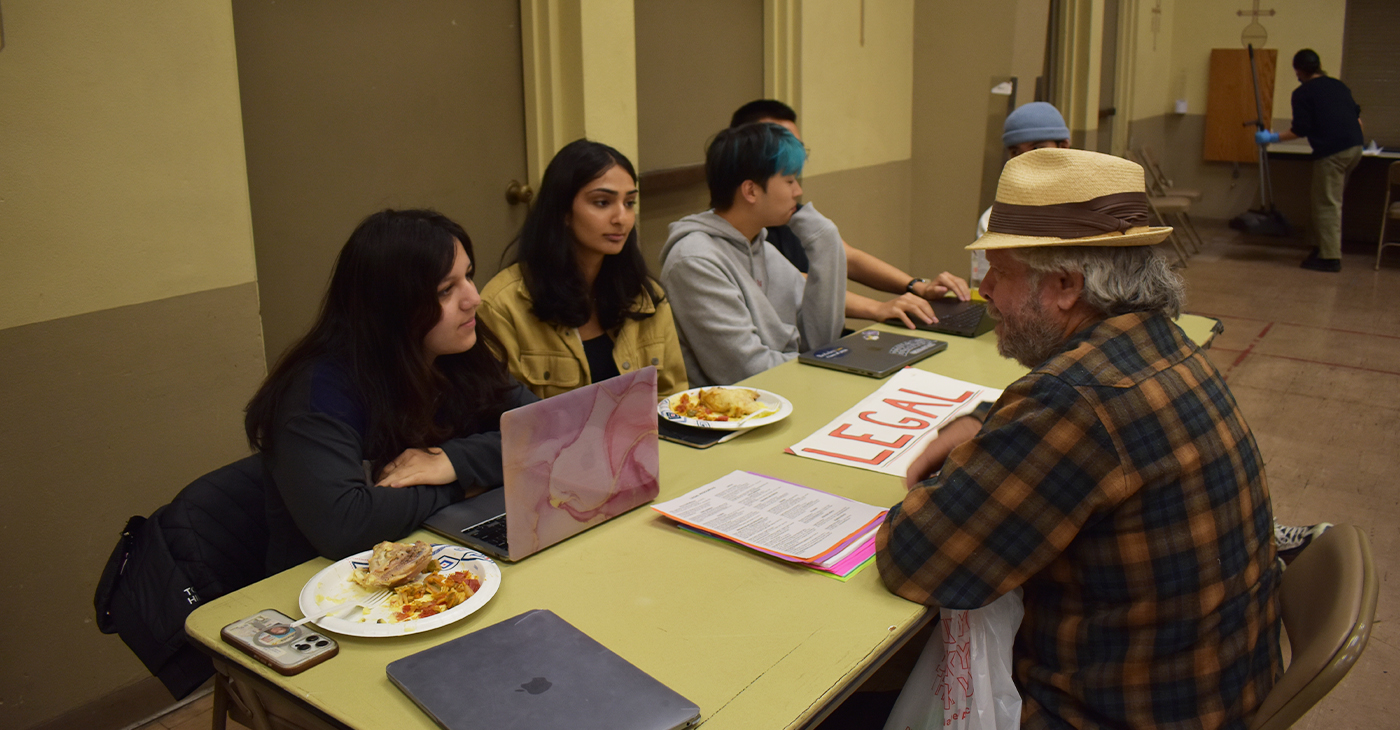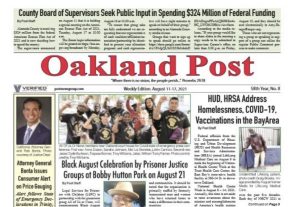Bay Area
California Black Elected Officials Unite to Crush ‘Unfair’ Effort to Recall Gov. Newsom

Fourteen California Black Democratic elected officials serving at the federal, state, county and city government levels joined hands in a virtual show of support for Gov. Gavin Newsom on Monday during a news briefing on Zoom. In one-minute statements, each one explained why she or he is standing behind Newsom as a Republican Party-led effort to recall California’s 40th governor gains ground across the state.
The two main organizations spearheading the recall effort, RescueCalifornia.org and RecallGavin2020.com, announced last week that they had collected the signatures of more than 2 million Californians for the petition they expect will soon trigger a recall election.
To begin the process of removing Newsom from office, the governors’ opponents must collect 1.5 million signatures – or 12% of the total number of people that voted in the last gubernatorial election. They must also submit the signatures to registrars in all 58 counties by close of business on March 17.
“This is the beginning. Let’s hope this is the last time we come together to talk about this. But mark my words, if this recall does qualify, we will crush it because we will be united. We will not fall for a trick,” said U.S. Congresswoman Karen Bass (D-CA-37), pointing out that Newsom has done nothing that should warrant him being removed from office.
Based on the price tag of past attempts to recall California governors — most recently Gov. Gray Davis in 2002 — an election to remove Newsom from office would cost taxpayers over $100 million, Bass said.
A total of 9.4 million voters cast ballots in the special election that ended Davis’ governorship.
Because the state will hold a gubernatorial election next year, Bass says, it is not fiscally responsible to hold one this year.
California’s highest-ranking Black elected official, U.S. Congresswoman Barbara Lee (D-CA-13), said there is “no reason to recall the governor of the state of California.”
“There will be an election in June 2022 and people will have a chance to vote. So, I urge everyone to join us in this unfair recall against Governor Newsom,” she said.
Sen. Steve Bradford (D-Gardena) said Newsom has been a “friend of the African American community.”
“This governor has stood with us on criminal justice reform. He has eliminated and paused executions because he realized the majority of people of death row are minorities – Black and Brown individuals who are over-sentenced and over-prosecuted all the time and many times are innocent,” said Bradford. “So, we stand with this governor. He has stood with us.”
So far, recall supporters say they have more than 2 million signatures – well over the minimum required by the state. The Secretary of State’s office has until April 29 to verify the signatures.
Many supporters of the recall effort say their plan to oust Newsom has been motivated largely by frustration over the strict coronavirus lockdown the governor imposed on the state. Some of the leading supporters are the California Republican Party, 2018 Republican gubernatorial candidate John Cox, former San Diego Mayor Kevin Faulconer and the Republican National Committee. Both Cox and Faulconer have put their names forward to replace Newsom, if he’s removed from office.
“We’ve proven we can win. And I did it twice in San Diego. San Diego’s registration mirrors that of California — 24% Republican — it’s the same in San Diego as it was statewide,” Faulconer said in an interview with the conservative magazine National Review.
“So, I know how to build coalitions and win and get results. I know how to use the power of the bully pulpit to go out and win the argument publicly and then win the vote. That’s what you have to do to be successful in California and you have to get not just Republicans but independents and a portion of Democrats as well,” Faulconer said.
But according to Ballotpedia, Republicans have had it in for Newsom for a while. This is the sixth recall attempt against Newsom since 2019. But the previous five weren’t successful.
In addition to Bass, Lee and Bradford, the other African American California elected officials who joined the media briefing to express their support for Newsom are: State Sen. Sydney Kamlager; Assemblymembers Autumn Burke, Reggie Jones-Sawyer and Mike San Francisco Mayor London Breed; Los Angeles County Supervisor Holly J. Mitchell; State Supt. of Public Instruction Tony Thurmond; California Board of Equalization Member Malia Cohen; Antioch Mayor Lamar Thorpe; Los Angeles City Councilmember Mark Ridley-Thomas; and Los Angeles City Councilmember Marqueece Harris-Dawson.
Gov. Newsom, who has said very little publicly about the recall, spoke up in an e-mail to supporters Monday.
“I am not going to take this recall attempt lying down,” Newsom said. “I’m going to fight because there’s too much at stake in this moment.”
The governor also took to Twitter.
“I won’t be distracted by this partisan, Republican recall — but I will fight it,” he tweeted. Getting Californians vaccinated, our economy safely reopened, and our kids back in school are simply too important to risk.”
Breed said Newsom had led the state through a difficult time. She said Newsom showed more leadership than former Pres. Donald Trump. According to Breed, Trump had abandoned San Francisco during the early days of the coronavirus pandemic. She dismissed the recall effort as a “right-wing attack.”
In Wash. D.C., Senators Elizabeth Warren (D-MA), Bernie Sanders (D-VT), Alex Padilla (D-CA) and Cory Booker (D-NJ) all came out in full support of Newsom the same afternoon. Shortly after, Georgia Democrat Stacey Abrams also voiced her support for California’s governor.
“This governor was duly elected and deserves to serve his full term,” said Cohen. “A recall is the ultimate statement of voter suppression. Citizens of California came together and voted disproportionately to support Gov. Newsom. It is our duty to fight this baseless, senseless recall.
Activism
Oakland Post: Week of December 18 – 24, 2024
The printed Weekly Edition of the Oakland Post: Week of December 18 – 24, 2024

To enlarge your view of this issue, use the slider, magnifying glass icon or full page icon in the lower right corner of the browser window. ![]()
Activism
City of Oakland Celebrates Reopening of Main Library
“Libraries are such critical facilities for all Oaklanders, whether it’s children coming to story-time, adults reading the newspapers or borrowing the latest novels, and people engaging with a range of services and programs that the library hosts,” said Council President and District 2 Councilmember Nikki Fortunato Bas. “Such library services and programs are only possible when the facility’s electricity, heating, roof, and lighting are fixed and running efficiently. I’m proud to join this re-opening of our Main Public Library.”

The branch had been closed since May for critical infrastructure upgrades
Special to the Post
The City of Oakland leadership and community partners gathered to celebrate the reopening of the Main Library after completion of critical infrastructure upgrades to enhance the library’s facilities and provide a better experience for patrons.
Renovations include new roof installation, skylight repair, critical electrical system upgrades, new boiler control system installation, auditorium heating and cooling system installation, and improvements to lighting, flooring and ceilings throughout the building.
“This is truly something to celebrate, the reopening of our wonderful Main Library! I congratulate the staff and our partners for this important project to make the Main Library a more comfortable place for everyone for years to come, said Oakland Mayor Sheng Thao. “Thank you to Oakland voters and the California State Library for making these crucial improvements possible.”
“Libraries are such critical facilities for all Oaklanders, whether it’s children coming to story-time, adults reading the newspapers or borrowing the latest novels, and people engaging with a range of services and programs that the library hosts,” said Council President and District 2 Councilmember Nikki Fortunato Bas. “Such library services and programs are only possible when the facility’s electricity, heating, roof, and lighting are fixed and running efficiently. I’m proud to join this re-opening of our Main Public Library.”
“Public libraries are a wonderful resource for our residents, offering a safe space for learning and being,” said District 3 Councilmember Carroll Fife. “It is critical to improve and modernize our libraries so more members of our community can utilize and enjoy them. I’m excited that the necessary renovations to the Main Library have been completed successfully and thank everyone involved, particularly the City team, who helped secured the necessary grant funds for this work.”
“I am proud of the City staff and project partners who kept this important project on schedule and under budget,” said Assistant City Administrator G. Harold Duffey. “The library is an incredibly important resource for our community members, and this project is an investment into the library’s future.”
“December 2nd was a momentous occasion for Oakland Public Library as we proudly reopened the doors of the Main Library following extensive infrastructure repairs,” said Director of Library Services Jamie Turbak. “Closing the Main Library for six months was no easy decision, as it serves as the central hub for our library system and is truly the heart of Oakland. Yet, this renovation was essential, representing more than just physical upgrades—it reflects our ongoing commitment to creating a safe, welcoming space for everyone.”
The City Administrator Jestin Johnson also attended the press conference and signalled his support for the completion of the record-setting completion of the renovations. Gay Plair Cobb, a newly appointed Library Commissioner said the Library represents the soul and brains of our community.
The Oakland Public Library secured funding for these crititcal repairs through a variety of sources. The California State Library’s Building Forward Library Facilities Improvement Program awarded the Main Branch $4.2 million. To comply with the grant terms, the City of Oakland provided matching funds through Measures KK, as approved by the Oakland City Council in October 2023.
The Main Library will host an Open House to celebrate the reopening on February 22, 2025, 10 a.m. – 5:00 p.m.
About the Oakland Public Library
The Oakland Public Library is a part of the City of Oakland in California and has been in existence since 1878. Locations include 16 neighborhood branches, a Main Library, a Second Start Adult Literacy Program, the Oakland Tool Lending Library, and the African American Museum and Library at Oakland (AAMLO). The Oakland Public Library empowers all people to explore, connect, and grow. Oaklandlibrary.org
Activism
A Student-Run Group Provides Critical Support Services to Underserved Residents
Those visiting The Suitcase Clinic can get legal advice, sign up for food assistance, receive housing resources, get medical help, or enjoy a hot, fresh meal. They can also get haircuts and foot washes from the student volunteers. Nilo Golchini, executive director of the clinic, said one of the goals for most of the students working there is helping bridge the gap of trust that exists between many unhoused people and the healthcare and social welfare systems.

Part One
By Magaly Muñoz
Every Tuesday evening, the dining hall of First Presbyterian Church fills up with dozens of people eating, laughing and moving from table to table, receiving much-needed services from UC Berkeley students – just a few blocks away from the university’s campus.
Individuals seeking support services can be found in this multi-stationed room on the south end of the church talking to law students, student case managers, or receiving medical attention in a corner by healthcare professionals.
This weekly event is hosted by Cal students through a volunteer-run program called The Suitcase Clinic.
The clinic, founded in 1989, was intended to offer free resources to underserved communities in Berkeley and surrounding cities. The majority of the clinic’s clientele are unhoused or low-income people looking for extra support.
Those visiting the clinic can get legal advice, sign up for food assistance, receive housing resources, get medical help, or enjoy a hot, fresh meal. They can also get haircuts and foot washes from the student volunteers.
Nilo Golchini, executive director of the clinic, said one of the goals for most of the students working there is helping bridge the gap of trust that exists between many unhoused people and the healthcare and social welfare systems.
During their tenure in the program, many of the students say they become strong advocates for homelessness rights.

Visitors of the Suitcase Clinic can receive haircuts and foot washing by student volunteers every Tuesday evening. Photo by Magaly Muñoz.
“We’re also standing in solidarity with them. So, it’s not saying, ‘I’m going to help you, but I’m also going to stand with you,’” Golchini said.
Student volunteers get extensive training prior to working directly with clients. Those interested have to take a semester-long class to become versed in areas such as outreach, intersectionality, how to interact with unhoused people, how to sign people up for social services. and more.
Volunteers then get to pick from three different clinics: General, Women’s, or Youth and LGBTQ+.
The General Clinic is the most popular among visiting residents, while Women’s and Youth/LQBTQ+ have more specialized services for attendees.
The Women’s Clinic has many of the similar services to General, but also includes nail painting, childcare, and massages.
The Youth and LGBTQ+ Clinic offers a safe space for young people navigating living on the streets, with services that include housing referrals, wellness and recreation classes and employment resources.
Golchini explained that it’s important for them to keep these clinics separate because the different demographics experience poverty and homelessness differently than those who visit the General Clinic.

Suitcase Clinic student workers posing for a photo with a frequent clinic attendee. The Clinic is open to Berkeley unhoused and low-income residents who need medical or legal service, or a hot meal. Photo by Magaly Muñoz.
“We’re able to provide spaces where people can come in and feel safe and not feel like they’re constantly worried that something’s going to happen to them,” she said.
An outreach team also visits encampments every other Saturday in the Berkeley area to provide hygiene kits and encourage people to visit the in-person clinic, if possible.
However, Golchini said engagement has been low for some time now due to a recent decision by the U.S. Supreme Court that allows cities to ban and cite people for sleeping on the streets.
She said a lot of their clientele got displaced to other cities over time, making it difficult to stay in contact with the services the Clinic was providing for them.
But that hasn’t slowed down the students at the Clinic, if anything, it has pushed them to do more for the community they serve.
-

 Activism4 weeks ago
Activism4 weeks agoOakland Post: Week of November 20 – 26, 2024
-

 Activism4 weeks ago
Activism4 weeks agoAn Inside Look into How San Francisco Analyzes Homeless Encampments
-

 California Black Media4 weeks ago
California Black Media4 weeks agoCalifornia to Offer $43.7 Million in Federal Grants to Combat Hate Crimes
-

 Black History4 weeks ago
Black History4 weeks agoEmeline King: A Trailblazer in the Automotive Industry
-

 California Black Media4 weeks ago
California Black Media4 weeks agoCalifornia Department of Aging Offers Free Resources for Family Caregivers in November
-

 California Black Media4 weeks ago
California Black Media4 weeks agoGov. Newsom Goes to Washington to Advocate for California Priorities
-

 Activism4 weeks ago
Activism4 weeks agoOCCUR Hosts “Faith Forward” Conference in Oakland
-

 Activism3 weeks ago
Activism3 weeks agoOakland Post: Week of November 27 – December 3, 2024




















































